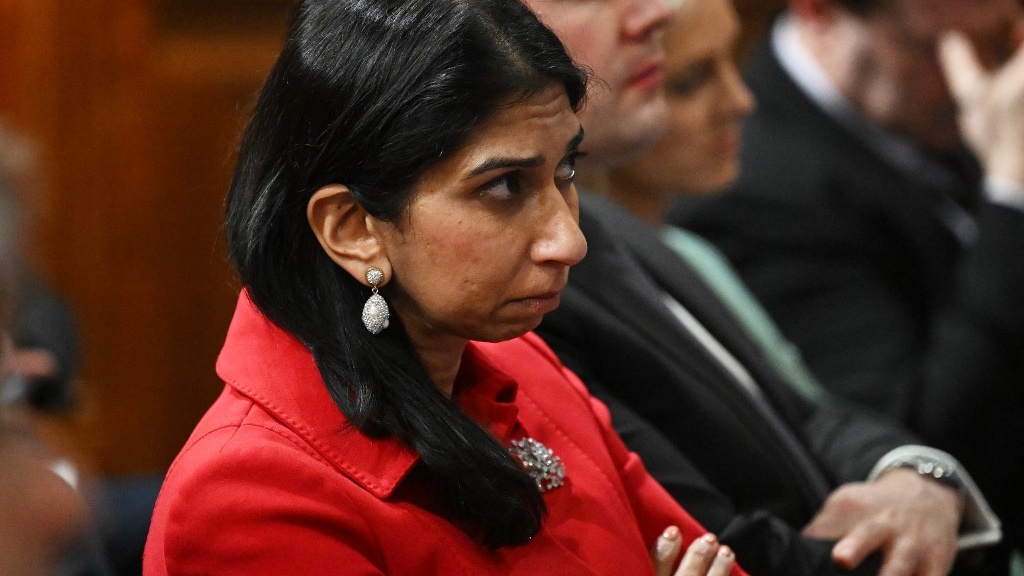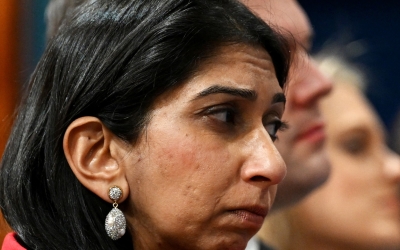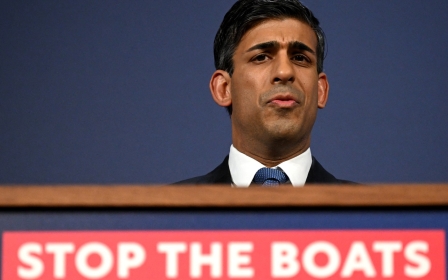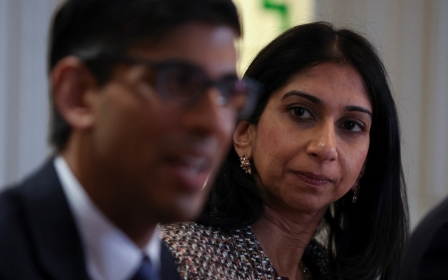British government must answer for Braverman's dangerous 'grooming gangs' column

Since taking office a year ago, British Prime Minister Rishi Sunak has become increasingly desperate to make headway in the opinion polls against Labour’s Keir Starmer.
And the higher Starmer’s poll lead - it currently stands at about 20 percentage points - the bigger the temptation for Sunak to appeal to hard-right voters who, the party believes, secured former Prime Minister Boris Johnson’s famous victory in the 2019 general election.
That means hard-right policies. Leading the charge has been Home Secretary Suella Braverman. She has repeatedly called for Britain to join Russia and Belarus as the only two countries outside the European Court of Human Rights.
She’s gone to war on immigration, warning of an “invasion” of asylum seekers and suggesting this week that uncontrolled migration poses an “existential challenge” to the UK.
She has played the Islamophobia card. This past April, in an article for the Mail on Sunday, Braverman falsely asserted that grooming gangs in the UK were “almost all British Pakistani.”
New MEE newsletter: Jerusalem Dispatch
Sign up to get the latest insights and analysis on Israel-Palestine, alongside Turkey Unpacked and other MEE newsletters
She added that British-Pakistani men were involved in child sexual abuse due to “cultural attitudes completely incompatible with British values” that “have been left mostly unchallenged both within their communities and by wider society”.
These were incredibly reckless and inflammatory remarks for a British home secretary to make - all the more so because Braverman’s claim about British Pakistani men was a fabrication that had been flatly contradicted by research from her own home office officials.
Poisonous far-right trope
A Home Office report published in December 2020 concluded that “group-based child sexual exploitation (CSE) offenders are most commonly white”. It found that the nationalities and ethnicities of suspects varied considerably, encompassing British, American, Dutch, Indian, Jamaican, and many others, including Pakistani.
By ignoring this official finding, Braverman fuelled the poisonous far-right trope that Pakistani Muslim men are eager to sexually abuse vulnerable white English girls - a grim echo of the persistent racial myth, which sustained segregation for so long in South Africa and the US, that white women are in danger of rape from Black men.
Whether she knew it or not, and she ought to have known it, Braverman was playing with fire in her Mail on Sunday article
And there is serious and credible evidence that the grooming gang narrative has inspired violence against Muslims. In August 2015, an 81-year-old Muslim pensioner, Mushin Ahmed, was murdered in a racial hate attack in Rotherham. His killer had baselessly accused Ahmed of being a “groomer”.
In 2017, Darren Osborne attacked worshippers outside the Finsbury Park Mosque, killing one and injuring others. He had become obsessed with hatred of Muslims after watching the BBC television drama Three Girls, about the “grooming gang” events in Rochdale.
Finally, and perhaps most chilling of all, the shooter at the mosques in Christchurch in 2019 was found to have “For Rotherham” written on his bullets.
Whether she knew it or not - and she ought to have known it - Braverman was playing with fire in her Mail on Sunday article. For this reason alone, the Centre for Media Monitoring, an offshoot of the Muslim Council of Britain, deserves high praise for challenging Braverman’s false claims.
Skewed media coverage
For many months after the complaint, the Mail on Sunday did not change its copy. In my view, the newspaper had good reason to stand its ground. As the recent judgment by the Independent Press Standards Organisation has made plain, the Mail on Sunday had taken the precaution of querying Braverman’s decision to single out British Pakistanis with the Home Secretary’s own advisors.
More than that, the newspaper went to Downing Street directly and got the all-clear. Both teams at the top level of government confirmed they had “no concern over this particular line”.
In other words, it’s not just Braverman’s Home Office that was behind the dissemination of falsehoods about British Pakistanis. So was Sunak’s Downing Street - a factor that makes the Mail on Sunday’s delay in clarifying its copy at the very least understandable.
But this delay had serious consequences. Courtesy of Braverman and Sunak’s Downing Street, the inflammatory lie about Pakistani Muslims was enabled to spread like wildfire.
In the aftermath - as a study from the Centre for Media Monitoring shows - the British media devoured the grooming-gang allegation. All mainstream channels covered it, mostly (but not always) in a balanced way.
Perhaps it should come as no surprise that GB News covered the subject obsessively, addressing it on no less than 59 occasions. “The claim that there is a cover-up within Pakistani communities protecting the Pakistani perpetrators was made on at least 18 occasions, with only three substantial challenges from guests,” the centre reported - and only a minority of clips (some seven percent) mentioned the Home Office report that disproved the central claim made in Braverman’s article.
Home Office silent
We cannot as a society take sexual abuse seriously enough. It is a terrible problem in Britain, as in many other countries. The underage victims of sexual abuse and rape endure horrific suffering, which scars them throughout their lives. Our society owes these innocent victims a solemn moral duty. We must not allow their stories to be hijacked for political advantage.
That is why I believe Braverman’s conduct is utterly reprehensible. Before the weekend, I sent a simple and straightforward question by email to the Home Office.
I worded it as follows: “Given the evidence that fabricated and inflammatory allegations about so-called grooming gangs have led to violence and murder in the past, why did the Home Secretary Suella Braverman repeat these false allegations in a British national paper?”
The Home Office declined to provide a response.
The views expressed in this article belong to the author and do not necessarily reflect the editorial policy of Middle East Eye.
Middle East Eye delivers independent and unrivalled coverage and analysis of the Middle East, North Africa and beyond. To learn more about republishing this content and the associated fees, please fill out this form. More about MEE can be found here.






